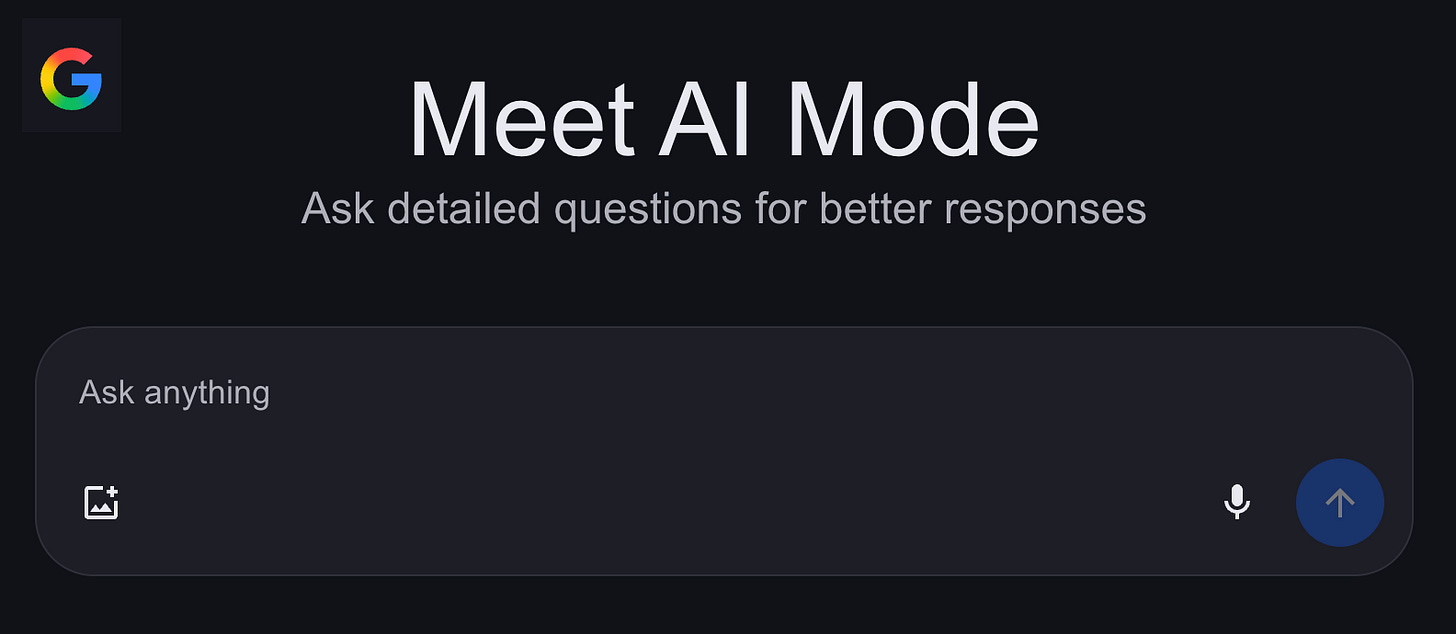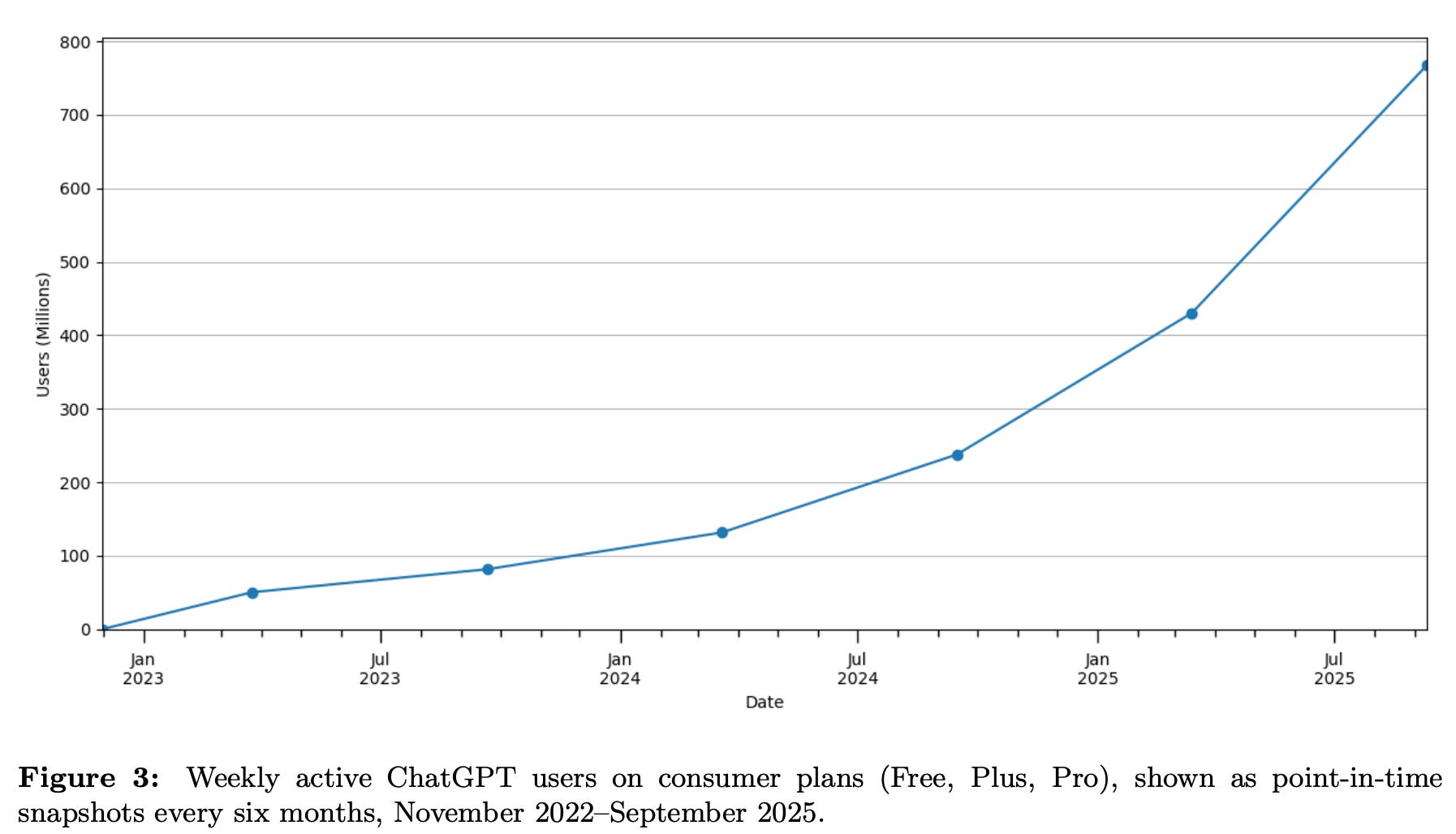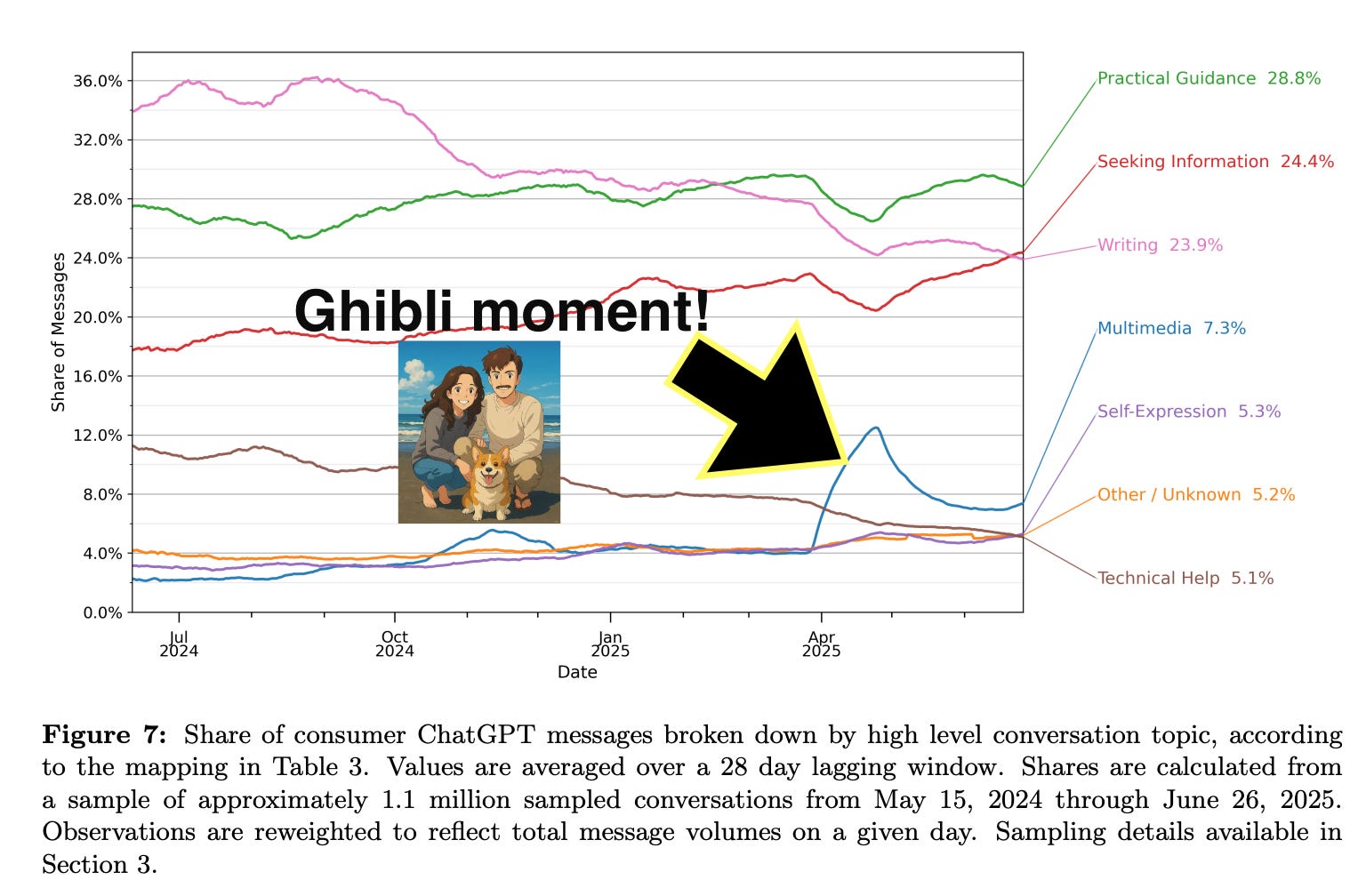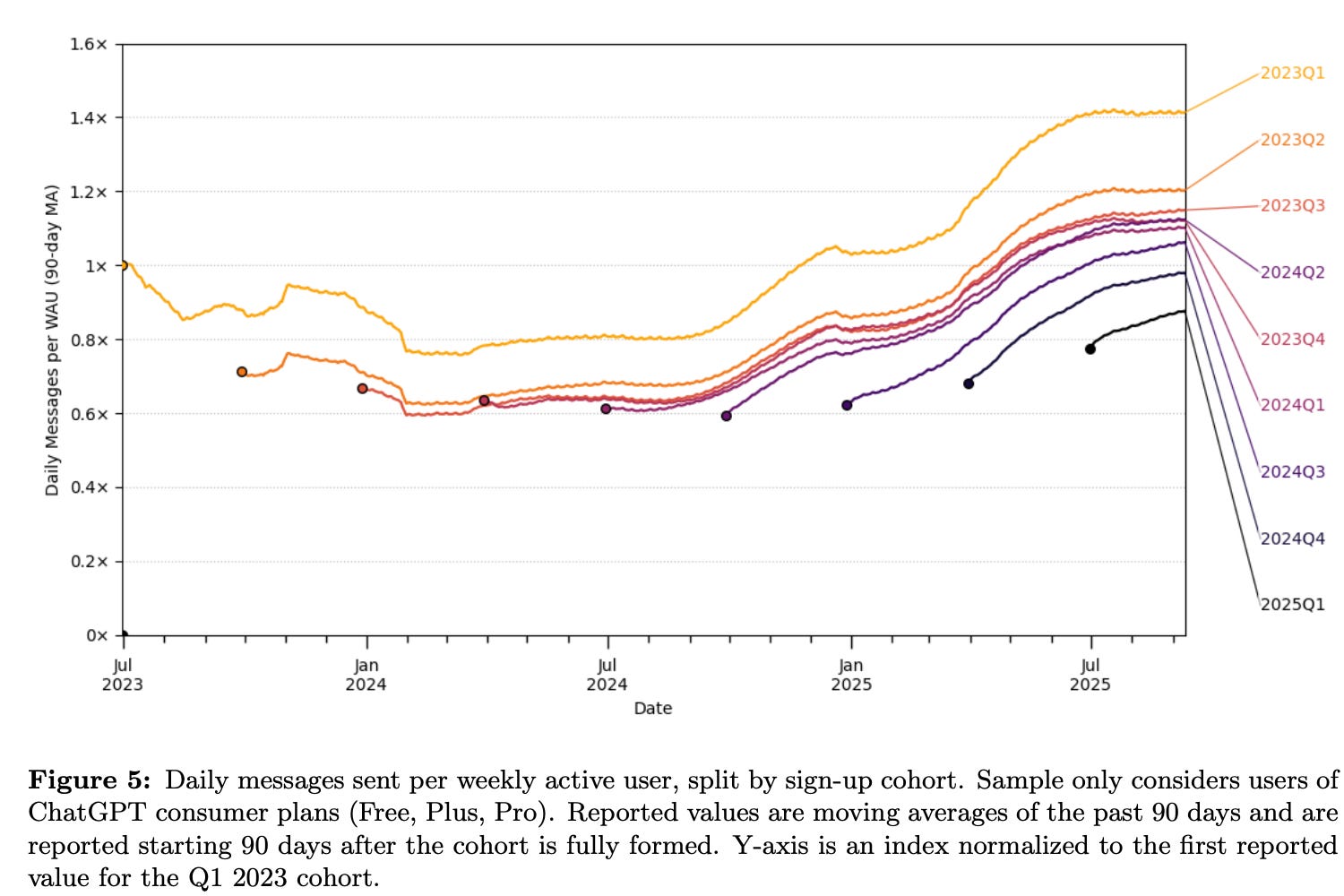590: Constellation Software vs AI, Google's Next Big Splash, YouTube's $100bn Payout, TikTok Deal?, ChatGPT Real-World Use, and Cheese
"vibe code the software that goes into a pacemaker"
About the time you finish doing something, you know enough to start.
—James C. Kinser
🧲🍳🚚📦 I had planned on sharing my early impressions of induction cooking today, but life throws curveballs: the stove delivered to us last week was a lemon 🍋 Thankfully, Costco has good customer service, and we’re getting a replacement on Saturday.
It’s not entirely dead, two of the burners work, so I’ve used it a couple of times. But not enough for a proper review. So far, the main thing that stands out is how freakishly fast it heats a skillet or boils a pot of water. One thing is obvious: Habits built over years of cooking will need to be updated, because if I try to do food prep while a pot or pan is heating up, I won’t have enough time 😬
This experience sent me down a rabbit hole into the details of how induction cooking works, and the underlying physics are fascinating. I had a pretty good idea of the general principles involved, but the engineering details are clever.
I recommend this video, the animation is excellent and beautifully shows the physics at play:
🔎📫💚 🥃 Exploration-as-a-service: your next favorite thing is out there, you just haven’t found it yet 👇
🏦 💰 Liberty Capital 💳 💴
✨ Constellation Software ✨ Announces Call on Impact of AI (Next Week) 📞🤖🔮
CSI announced yesterday that it will hold a call on the morning of September 22nd to discuss AI’s impact on its businesses and answer questions from shareholders.
Mark Leonard gave this context:
“One of our largest shareholders asked CSI for a question and answer session regarding AI’s impact on software businesses. We felt that the discussion would inevitably turn from the general to the CSI-specific, so we suggested a webcast where all shareholders would be able to pose questions. This is a nice example of an enterprising shareholder catalysing corporate action that benefits all shareholders.
AI has created uncertainty for our employees, shareholders and customers. CSI management don’t purport to know the future of AI. We have a group of AI specialists throughout CSI. They don’t know the future of AI, either. They do, however, help us monitor our AI progress and that of AI generally in our marketplaces. We’ve asked four of them to join our panel for this discussion. I hope you enjoy the Q&A session and emerge more informed.”
It should be interesting, but I don’t expect any big surprises.
If I had to guess, the summary of that call will be something like this:
It’s a double-edged sword: It helps in some ways, hurts in others ⚔️
‘Mission-critical’ is misunderstood: You don't just vibe code the software that goes into a pacemaker (so to speak) 🫀💾
Writing code is one of multiple ingredients that go into a successful mission-critical VMS that dominates a niche, but it’s not the only ingredient. Domain knowledge within the vertical and proprietary customer data are also essential.
For customers, software is a tiny % of their total expenses. They may spend more on air conditioning or fleet vehicle tires. So, for them to be tempted to switch to a new unproven entrant that is trying to undercut the established player on price means taking a pretty big risk for little reward.
For existing VMS companies, AI coding tools are an organic growth opportunity. It’s hard to find enough talented engineers to build every feature that you wish you could build, but with AI doing more of the work, I wouldn’t be surprised to see more new features and modules shipping. If these things are useful, customers will be happy to pay for them (because they help them run their business better and make money).
Maintenance of existing software may become easier with AI. Modernising, refactoring, bug fixing, etc. If all that improves, customers may be more satisfied with their existing providers and have fewer reasons to look elsewhere.
AI has the potential to help with cost-cutting. Investors who are used to large public companies often don’t understand that a lot of these tiny VMSes are lifestyle businesses. When the founder retires and sells the company, you can improve margins by doing things like removing the founder’s wife and nephew from the payroll, cutting their company cars, stopping the founder’s pet project that doesn’t have much commercial potential, etc. For a $2m annual revenue company, these types of cuts can make EBITDA margins go from, say, 15% to 35%. Well, maybe with AI tools, it’ll be possible to cut a little more on average and maybe they get slightly better margins because they need 1-2 fewer employees to do what needs to be done (eg. AI chatbots help offload some customer support tasks, code documentation, etc).
It's possible to imagine a scenario where we get artificial superintelligence relatively soon, and anyone can type almost anything into an AI, and it will go and do it without errors. The software fully works, everything is HIPAA compliant, and follows every regulation in your industry, the UX is great, and there aren’t bugs that end up costing you revenue because every time the system goes down, you can’t run your business, or if you lose data or are hacked, you may get sued or go out of business. But in such a world, I’d be more worried about the large horizontal players first (ServiceNow, Salesforce, Microsoft, Oracle, Workday, Atlassian, SAP, Adobe, the hyperscalers’ homegrown saas offerings, etc) than the tiny niche VMSes. There’s a lot more money to be made going after these hundreds of billions of revenue. But in such a world, VMS will eventually be attacked too. The question becomes: Can existing VMSes use that super-AI, combined with their deep vertical expertise, to build something so great that customers still won’t switch? 🤔
(I don’t know why I just kept going with bullets ¯\_(ツ)_/¯)
Carried No Interest tweeted something on AI vs software that also provides context for how to think about the situation here. I recommend reading the whole thing, but here are a few highlights:
1) 'time to yes': How long does it take to sell your software after a customer learns about it? Is it a 3-6 month sales cycle? Is time to yes instant? DO I NEED TO TALK TO SOMEONE ON THE PHONE TO PURCHASE IT? [...]
2) 'implementation time': Software that takes a long time to implement. [...] This is the amount of time it takes between wiring the money and the company actually USING the software. An example might be vertical software for a veterinarian. It could take a full month to configure the software, get all the users onboarded, work through bugs, etc. How long does it take to implement calendly? Well about 4-5 minutes. [...]
'Tear Out Time': some people call this switching cost, but I delineate the two. How long does it take a customer to 'tear it out' and switch? This is NOT the same as switching cost, although some people mistakenly (imo) lump them together. This is measured in TIME. [...]
Switching Cost: How much does it cost me to switch? This can be a real number. Let's say I want to switch my CRM from Salesforce to Attio. Not only do I have a probably high 'tear out time', I also have to pay SOMEONE to migrate my sales data from Salesforce to Attio. There's a real dollar cost here, even if Attio claims to have the softawre to do it. What's my switching cost from Calendly to Cal? ...near 0. [...]
Data Moat / Network Effects: Does your business collect data that is difficult to collect via LLM? Do you have data that drives product utility that is difficult to attain? Do you have network effects?
With all that said, Mark Leonard is a buyer of software companies.
The fact that he wants software company valuations to be lower is a given.
He’s tried to talk down the stock price of Constellation multiple times since around 2010, and I wouldn’t be surprised if he tried again (in good part because employees are buyers of the stock).
I’ll report back next week after the call to see how my predictions held up.
The Next Big AI Moment Will Be… 🥁
Here’s a little prediction:
At some point, Google will make its ‘AI Mode’ the default in search, and it’ll send huge waves across the whole industry. It won’t be as big as the original release of ChatGPT, but big enough to be mentioned on the Wikipedia page for AI milestones in the 2020s.
Personally, I’ve made the URL for Google AI Mode my browser’s home button a few weeks ago and I haven’t regretted it. It’s surprisingly good. It’s what Perplexity wishes it could be, which pains me a little, because Perplexity was so strong out of the gate and showed the incumbents how AI could integrate search at a time when others had no or bad search. But Google is executing better now, which isn’t surprising since they have so many hard-to-replicate advantages… if they can only get out of their own way and keep the bureaucracy and internal politics at bay long enough to ship products.
On AI Mode: They’re already nudging users toward it with the prominent animated button next to regular search, but most users are creatures of habit and won’t click on it. To get the masses to switch, they’ll need to make it the new default.
🎂📺 YouTube has Paid Creators $100bn+ Over the Past Four Years 💰💰💰
For its 20th anniversary, YouTube announced:
we've paid out over $100 billion to creators, artists, and media companies globally over the last four years.
That’s a lot of money.
We’re now in the same neighborhood as the global film and TV businesses, but growing much faster, so it’s likely to eclipse them in the coming years (estimates vary and it depends what you include or not, but I’ve seen numbers in the range of $100bn for global film market, and $300-400bn for global “TV services” market, which probably includes both revenue from advertising and connectivity).
The scary thing to consider is that, as much power as Google has because of the search side of the business, the influence and control that they have over global culture because of YouTube is also immense 🤔
Every time they tweak the recommender algo, millions of creators end up making different videos than they would have otherwise (in small ways or in big ways), and billions of people end up seeing videos that they may not have seen on the previous version of the algo.
Some things never get created because they happen to monetize badly or not get recommended by the algo, while there’s a deluge of others because they are rewarded.
Without even suggesting anything explicitly nefarious, that’s a lot of power to be concentrated in one company, and it should make us reflect, not only about today, but about how this power will be used in the future when completely different people are in charge.
🕰️ 🇨🇳🤝🇺🇸 TikTok Tic Toc… Do we finally have a deal? 🤨
It could be BS to justify a fourth extension to avoid and avoid the enforcement of the law, but the white house claims a “framework” for a deal:
The deal is expected to close in the next 30 to 45 days, according to the sources, who asked not to be named because the details of the negotiations are confidential. As part of the agreement, Oracle will keep its cloud deal with the platform, the people said.
“Where this thing is capitalized and how large it is remains to be seen,” Faber said Tuesday on CNBC’s “Squawk on the Street.” ”’I’m hearing it’s actually going to be relatively small in terms of the actual size of the checks that are written for the entity itself, and it will not be something that is going to go public at some point.”
My guess is that a bunch of friends of the administration will get a piece of the deal…
Update: After writing the above, this bit of news came out:
TikTok’s U.S. business would be controlled by an investor consortium including Oracle, Silver Lake and Andreessen HorowitzIt’s reported they would have an 80% stake while Chinese shareholders would keep the remaining 20%.
What’s strange about the leaked ‘framework’ is this:
Wang Jingtao, deputy head of China’s powerful cyber security regulator, on Monday said US and Chinese officials had agreed a framework that included “licensing the algorithm and other intellectual property rights”. [...]
It remains unclear to what extent TikTok’s Chinese parent would retain control of the algorithm in the US as part of a licensing deal.
So if TikTok is being banned because of national security, does it make sense for the new spun-out entity to use the Chinese algo? How could that be legal? The law that bans TikTok makes it pretty clear that it would be illegal for China to retain an operational relationship
Hopefully, they mean that the algo would be fully forked, and the US entity would get the source code, and not that the Chinese mothership would have remote control over it and ship black box binaries over 🤔
🧪🔬 Liberty Labs 🧬 🔭
🤖🔍 How People Use ChatGPT, Inside Scoop Edition 🕵️♂️
There's plenty of anecdotal information about how people use ChatGPT, and most of us probably look at our own usage and extrapolate from it (which can be misleading, especially if you’re a weirdo!).
So it's great to see actual data from OpenAI about how their users really use the product.
The paper is here, here are some of my highlights:
Non-work usage is dominant and growing faster than work-related usage.
as of July 2025 about 70% of ChatGPT consumer queries were unrelated to work; while both work-related and non-work-related queries have been increasing, non-work queries have been increasing faster.
"Writing" is the most common work-related task, and most of that is editing, not creating from scratch.
Writing is by far the most common work use, accounting for 42% of work-related messages overall and more than half of all messages for users in management and business occupations. About two-thirds of Writing messages are requests to modify user text rather than to produce novel text from scratch.
The gender gap in ChatGPT usage has nearly closed.
In the few months after ChatGPT was released about 80% of active users had typically masculine first names. However, that number declined to 48% as of June 2025, with active users slightly more likely to have typically feminine first names.
ChatGPT adoption is growing fastest in low- and middle-income countries.
ChatGPT usage has grown especially fast over the last year in low- and middle-income countries.
"Practical Guidance" is the most common use case, not just "Seeking Information."
Nearly 80% of all ChatGPT usage falls into three broad categories, which we call Practical Guidance, Seeking Information, and Writing. Practical Guidance is the most common use case...
Even the earliest users are finding new ways to use ChatGPT and are increasing their usage over time. It’s a ratchet, churn doesn’t seem like a problem:
The figure shows that earlier sign-ups have consistently had higher usage, but that usage has also consistently grown within every cohort, which we interpret as due to both (1) improvements in the capabilities of the models, and (2) users slowly discovering new uses for existing capabilities.
Despite all the attention and headlines, computer programming and emotional support are surprisingly small use cases.
we find the share of messages related to computer coding is relatively small: only 4.2% of ChatGPT messages are related to computer programming... Second, we find the share of messages related to companionship or social-emotional issues is fairly small: only 1.9% of ChatGPT messages are on the topic of Relationships and Personal Reflection and 0.4% are related to Games and Role Play.
"Asking" for information is growing faster than "Doing" tasks and is rated as higher quality.
About 49% of messages are users asking ChatGPT for guidance, advice, or information (Asking), 40% are requests to complete tasks that can be plugged into a process (Doing)... Asking messages have grown faster than Doing messages over the last year and are rated higher quality...
The economic value of ChatGPT is primarily in "decision support" for knowledge workers.
ChatGPT likely improves worker output by providing decision support, which is especially important in knowledge-intensive jobs where productivity is increasing in the quality of decision-making.
Users still skew young.
Nearly half of all messages sent by adults were sent by users under the age of 26.
User satisfaction with responses is improving pretty fast.
In late 2024 Good interactions were about three times as common as Bad interactions, but Good interactions grew much more rapidly over the next nine months, and by July 2025 they were more than four times more common.
ChatGPT reached ~10% of the world's adult population in under 3 years.
By July 2025, 18 billion messages were being sent each week by 700 million users, representing around 10% of the global adult population. For a new technology, this speed of global diffusion has no precedent
These users are sending more than 2.5 billion messages/day, and growing fast! Jensen must be smiling 😎
🎨 🎭 Liberty Studio 👩🎨 🎥
🧀 "I don't see cheese as expensive, I see cheese as valuable"👩🍳
Ok, you know I love a good cheese. I’ve even done Parmesan reviews on this steamboat a few years ago, and my mother-in-law always gives me a big wedge of it for Xmas.
The first time it was kind of a joke, but it’s the gift I enjoyed the most, so it turned into a tradition. Somehow I’d feel weird buying it for myself and just sitting there, eating chunks of it without anything else, but when *someone else* gives it to me, it works!
Anyway, all this to say that Adam Moskowitz is an incredibly passionate cheese evangelist. I met him last year at an OSV offsite, and he shared his story with us and brought us some cheese to try. His enthusiasm is contagious, and I’ve been looking at cheese differently since. We’ve been working with him on a few projects, and this series is one of them: A Cheese Course.
I hope you enjoy it too, and hopefully it makes you look at cheese a bit differently!
Be warned: you’ll probably be hungry within minutes of starting an episode…







I think you're right about Google AI mode -- it's pretty awesome. While I was using it, I thought about how long it's been since I've used Perplexity.... That then reminded me to tell you that I thought your write-up on Cloudflare's war on AI crawlers was super fascinating.
I feel like I understand why some people would have an instinct to "protect" content creators who are losing massive amounts of traffic to LLMs, but you raised a lot of logical reasons that may be a short sighted concern. I'm a little torn on it -- but Cloudflare must feel emboldened for now. They are getting a crazy amount of publicity for it!
This one made me feel constipated;) Thanks especially for the primer on induction heating. I'm still not ready to give up my gas stove, though.